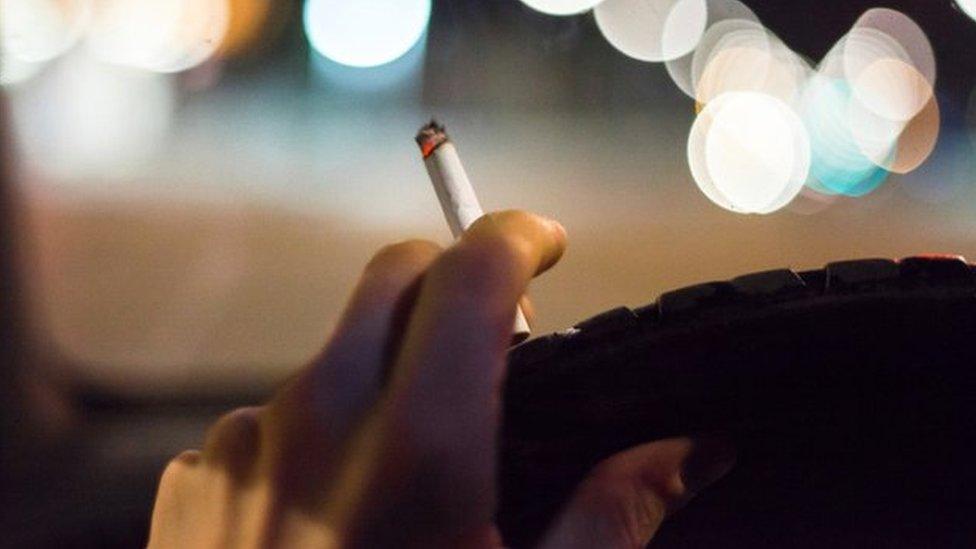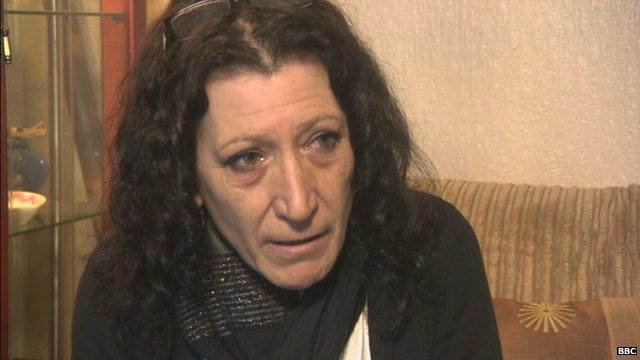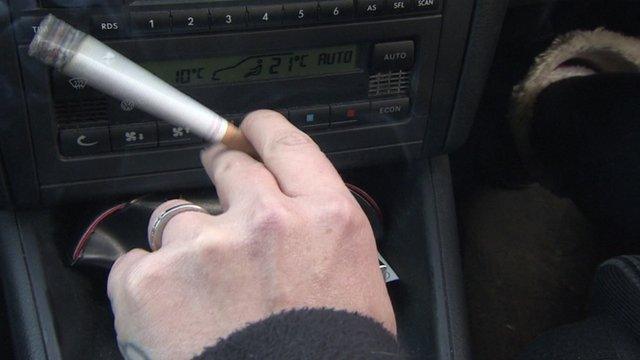Car smoking ban comes into force
- Published
- comments
A doll with air particle sensors nearby was used to conduct tests
A law banning smoking in vehicles carrying children has come into force in England and Wales.
Drivers and passengers who break the law could face a penalty fine of £50 - but police say they will take a non-confrontational approach initially.
Whenever an under-18 is in the car, smokers will still be liable even if the windows are down or sunroof open.
But the law will not apply to people who are driving in a convertible which has the roof down.
Nor does it apply to e-cigarettes.
The Scottish Parliament is expected to consider bringing in its own law banning smoking in cars carrying children next year.
Lucy Hardcastle says her children will just have to put up with her smoking in the car
Meanwhile, officials in Northern Ireland said they would look at how the ban is working elsewhere before deciding whether or not to follow suit.
More than 430,000 children are exposed to second-hand smoke in cars each week, according to the British Lung Foundation.

Passive smoking
Smoke can stay in the air for up to two and a half hours even with a window open
Second-hand smoke contains more than 4,000 chemicals, some of which are known to cause cancer
Exposure to second-hand smoke has been strongly linked to chest infections, asthma, ear problems and cot death in children
Bans on smoking in cars when children are present already exist in some US states, including California, as well as in parts of Canada and Australia
Research indicates 300,000 children in the UK visit a GP each year because of the effects of second-hand smoke, with 9,500 going to hospital
Smoking in a car creates a higher concentration of toxins than in a bar - some research has put it at 11 times higher

Exposing children to passive smoking can increase the risk of asthma, meningitis and cot death.

Smoking will be banned if under-18s are in the car
Health campaigners have hailed the move as a "tremendous victory" and the most significant milestone since the ban on smoking in public places was introduced in 2007.
But Simon Clark, director of the smokers' lobby group Forest, said the new law was unnecessary and almost certainly unenforceable.
"If drivers are spotted smoking will they be stopped in case there's a child in the back? The authorities, especially the police, must have better things to do."

Analysis: Will the new law work?
The acknowledgement by the police that there will be a light-touch approach to the smoking ban in cars has raised some eyebrows.
But this was always likely to be the case. In fact, the same approach was taken when the smoking ban in enclosed public places - bars, restaurants and clubs - was introduced in 2007.
It was not made a priority by police or council officials, but the fact it was the law changed attitudes and behaviour.
And that is the point. Like other laws, the aim of this one is public protection - from second-hand smoke. But there is also a wider ambition too: to make smoking socially unacceptable.

Steve White, chairman of the Police Federation, said it would be "extremely challenging" to enforce the ban.
He told BBC Radio 4's Today programme: "The reality of the situation is we are struggling to attend burglaries.
"Should we be focusing on people smoking in cars with children in the cars or should we be focusing on burglaries?"
A National Police Chiefs' Council spokeswoman said: "Police forces will be taking an educational, advisory and non-confrontational approach when enforcing the new legislation.
"This would see people being given warnings rather than being issued with fines, which would give time for public awareness of the offences to build."

A history of smoking legislation in the UK

1965: Government bans cigarette advertising on television
1971: Ministers announce health warnings to be carried on all cigarette packets
1984: Smoking banned on London Tube trains
2002: Legislation passed banning tobacco advertising, promotion and sponsorship
2005: Smoking banned on all trains
2006: A ban on smoking in public places, including bars and restaurants, comes into effect in Scotland
2007: England, Wales and Northern Ireland introduce their own bans on smoking in public places
2008: Picture health warnings introduced on cigarette packets
2012: Large shops are banned from displaying cigarettes. Smaller shops to follow suit in 2015
2015: Ban on smoking in cars where children are present
- Published10 February 2014

- Published17 December 2014
